Congratulations to our Neag School alumni, faculty, staff, and students on their continued accomplishments inside and outside the classroom. If you have an accolade to share, we want to hear from you! Please send any news items and story ideas to neag-communications@uconn.edu.
In addition to the Dean’s Office and Department achievements, explore this edition’s list for Accolades from the following: Faculty/Staff; Alumni; Students; as well as In Memoriam.
Dean’s Office
The Neag School Alumni Board virtually celebrated the 2020 Neag School Alumni Awards in October. UConn’s Jonathan XIV, Dean Gladis Kersaint, and Alumni Board Past President Kathryn (Lenehan) Keenan ’10 (ED), ’11 MA, ’19 6th Year were part of the celebration, along with Neag School music education students who coordinated a virtual performance of UConn’s “Old Connecticut,” also known as “UConn Alma Mater,” in honor of the Neag School’s 2020 awardees. The celebration featured landing pages for each awardee with acceptance speeches and testimonials, as well as the winners of the 2020 Alumni Board Scholarship, Rogers Educational Innovation Fund, Dr. Perry A. Zirkel Distinguished Teaching Award. Visit the virtual celebration online.
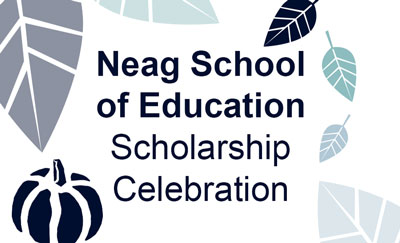 The Neag School hosted the Annual Scholarship Awards Celebration virtually in November. Donors, alumni, faculty, students, and their guests gathered the online event recognizing more than 70 Neag School student scholarship recipients and featuring speakers who are supporting or are impacted by Neag School scholarships — including donors Jim ’87 (CLAS) and Beth Degnan ’87 (CLAS), students Luis Ferreira, Tamashi Hettiarachchi, and Gabriela Reyes, and alumna Jill Long’20 MA. Associate Dean Jason Irizarry and Dean Gladis Kersaint also shared remarks, and music education students Jonah Garcia andErin Naclerio performed together virtually. Watch the event recording.
The Neag School hosted the Annual Scholarship Awards Celebration virtually in November. Donors, alumni, faculty, students, and their guests gathered the online event recognizing more than 70 Neag School student scholarship recipients and featuring speakers who are supporting or are impacted by Neag School scholarships — including donors Jim ’87 (CLAS) and Beth Degnan ’87 (CLAS), students Luis Ferreira, Tamashi Hettiarachchi, and Gabriela Reyes, and alumna Jill Long’20 MA. Associate Dean Jason Irizarry and Dean Gladis Kersaint also shared remarks, and music education students Jonah Garcia andErin Naclerio performed together virtually. Watch the event recording.
The Neag School has issued to education leaders nationwide its 2019-20 By the Numbers Report, offering a high-level glimpse into the School’s current rankings, research expenditures, global education efforts, scholarship support, and other highlights.
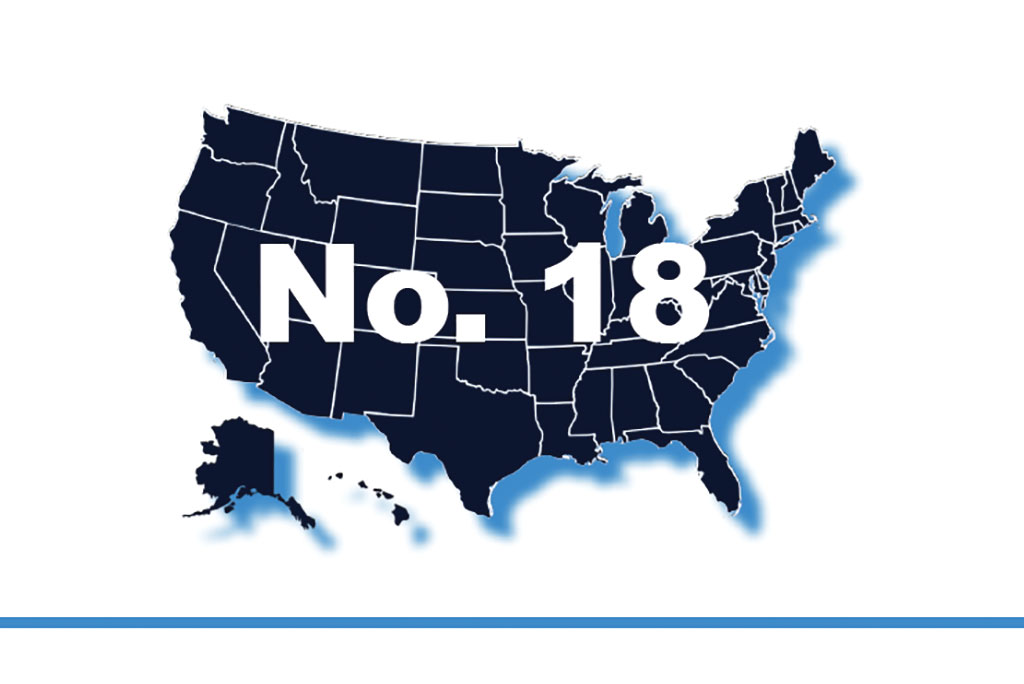
Julie M. Wood ’71 (ED), ’72 MA, a renowned educational consultant, has decided to leave a planned gift to the Neag School to support research in an area close to her heart: children’s literacy. She has set up an endowment that will generate funding every year for a faculty member in the Neag School to conduct research to support children’s literacy development.
The Neag School hosted its Fall 2020 Neag School Faculty Development Series, including speakers David Kirkland from the NYU Metropolitan Center for Research on Equity and the Transformation of Schools; Anjalé Welton, professor of educational leadership and policy analysis from the University of Wisconsin-Madison (watch the recording of Welton’s talk); and Yolanda Sealey-Ruiz, a poet and associate professor of English education from Teachers College at Columbia University.
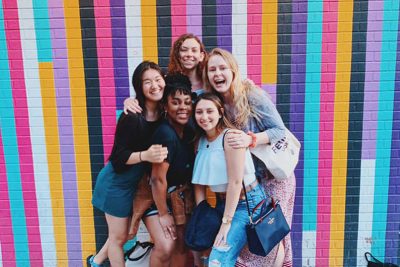
The UConn BOLD Women’s Leadership Network, originally co-developed by Sally Reis and currently directed by Neag School doctoral student Liza Boritz, received a $1.2 million grant from the Helen Gurley Brown Pussycat Foundation.
Tamika La Salle, Diandra J. Prescod, and Saran Stewart were among the presenters for the UConn Office of Diversity and Inclusion’s Strike for Racial Justice event, a virtual teach-in held in September.
Milagros Castillo-Montoya is a co-coordinator of a new UConn course titled U.S. Anti-Black Racism, which also includes Neag School faculty presenters Saran Stewart, Diandra J. Prescod, Violet Jiménez Sims, and Tamika La Salle.
The Neag School co-sponsored InCHIP’s virtual panel discussion “Pandemic Parenting: Understanding the Effects of COVID-19 on Child Caregivers” in November.
Department of Curriculum and Instruction (EDCI) and Teacher Education
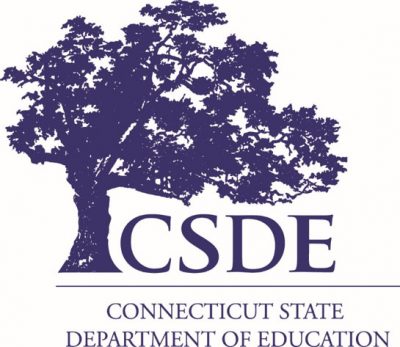 The Connecticut Partnership for Literacy Success, formerly known as CK3LI, launched a website last month.
The Connecticut Partnership for Literacy Success, formerly known as CK3LI, launched a website last month.
The Reading Language Arts Center co-sponsored a virtual presentation titled “Showing Up: Rethinking Attendance in the Pandemic Age” in October.
The UConn Asian and Asian American Studies Institute hosted a virtual discussion titled “Hyper Education: Why Good Schools, Good Grades, and Good Behavior Are Not Enough,” which included panelists Glenn Mitoma, and Neag School graduate students Kiana Foster-Mauro, Kyre McBroom, and Damayanti Rane-Castrodad.
David Moss and Alan Marcus were featured for their work with the Neag School’s study abroad programs
Department of Educational Leadership (EDLR)
The Center for Education Policy Analysis (CEPA) hosted a virtual speaker series last month featuring Domingo Morel from Rutgers University for a talk titled “Takeover: Race, Education, and American Democracy” and another speaker series this month featuring Saran Stewart from the Neag School for a talk titled “Intersectionality as Method: Applying Theory to Practice.” CEPA also recently issued a research brief, authored by Ph.D. student Chelsea Connery, examining police presence in schools and its effect on students.
The Higher Education and Student Affairs (HESA) program published a blog post titled “Celebrating Latinx Scholarship and Activism in HESA,” highlighting faculty and students’ contribution to scholarship, service, and activism in higher education.
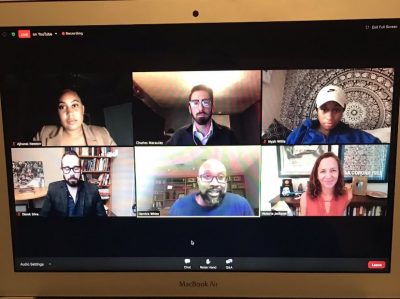
The Sport Management program recently hosted several Beyond the Field events, including “Cultural Power of Sport: Black Lives Matter and Athlete Activism” in September, “College Athletics in the Time of COVID-19: A Global Pandemic and College Athletics” in October, and “Social Justice in Sport” in November. View the October event recording on YouTube.
Department of Educational Psychology (EPSY)
EPSY was the most successful department in terms of grant dollars ($16 million) at the Storrs campus in new awards for FY 2020, according to a recently released report from the Office of the Vice President for Research.
The National Technical Assistance Center on PBIS, co-directed by Brandi Simonsen, recently published new resources on supporting schools during the 2020-21 school year, including practice briefs, recorded webinars, action planning templates, as well as a resource guide, in collaboration with the National Center on Intensive Intervention and the Integrated MTSS Research Network, titled “Returning to School: Considerations for Students With the Most Intensive Behavioral Needs, A Guide to Supporting Students With Disabilities, Their Families, and Educators During the 2020–21 School Year.” These materials have been presented to thousands of educators in Vermont, Michigan, Minnesota, and California, as well as to state-level education leaders through events held by the Council for Chief State School Officers and the National Association of State Directors’ of Special Education.
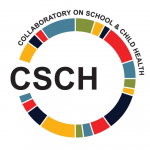 The UConn Collaboratory on School and Child Health (CSCH), directed by Sandra Chafouleas, contributed to the guide “Planning for the Next Normal at School: Keeping Students, Staff, and Families Safe and Healthy,” published on Kaiser Permanente’s website Thriving Schools. CSCH also recently issued a brief in honor of World Mental Health Day titled “A 2020 Focus on the Social, Emotional, and Behavioral Well-Being of College Students”, which was co-written in part by alum Emily A. Iovino 15 (ED), ’16 MA, ’20 Ph.D., Chafouleas, and graduate students Hannah Perry and Alyssa Bunyea. Chafouleas was also a panel moderator in October for the UConn Institute for Collaboration on Health, Intervention, and Policy’s (InCHIP) virtual event “Promoting Alternatives to Police in Schools: Addressing the School to Prison Pipeline” centered on U.S. Sen. Chris Murphy’s Senate Bill No. 4360: Counseling Not Criminalization in Schools Act.
The UConn Collaboratory on School and Child Health (CSCH), directed by Sandra Chafouleas, contributed to the guide “Planning for the Next Normal at School: Keeping Students, Staff, and Families Safe and Healthy,” published on Kaiser Permanente’s website Thriving Schools. CSCH also recently issued a brief in honor of World Mental Health Day titled “A 2020 Focus on the Social, Emotional, and Behavioral Well-Being of College Students”, which was co-written in part by alum Emily A. Iovino 15 (ED), ’16 MA, ’20 Ph.D., Chafouleas, and graduate students Hannah Perry and Alyssa Bunyea. Chafouleas was also a panel moderator in October for the UConn Institute for Collaboration on Health, Intervention, and Policy’s (InCHIP) virtual event “Promoting Alternatives to Police in Schools: Addressing the School to Prison Pipeline” centered on U.S. Sen. Chris Murphy’s Senate Bill No. 4360: Counseling Not Criminalization in Schools Act.
Faculty, students, and alumni from the Renzulli Center for Creativity, Gifted Education, and Talent Development published several articles in the September issue of Journal for the Education of Gifted. The articles included “Identifying and Serving English Learners in Gifted Education: Looking Back and Moving Forward,” co-published by E. Jean Gubbins, D. Betsy McCoach, Del Siegle, Susan Dulong Langley ’02 MA, ’20 Ph.D., and Sharon Ware ‘11 Ph.D., along with colleagues; “Promising Practices for Improving Identification of English Learners for Gifted and Talented Programs,” co-published by Gubbins, Siegle, doctoral student Pamela Peters, McCoach, Dulong Langley, along with others; and Proficiency and Giftedness: The Role of Language Comprehension in Gifted Identification and Achievement,” co-published by affiliated research scientist Daniel Long, McCoach, Siegle, doctoral student Sarah Newton, Gubbins, alumna Carolyn Callahan ’73 Ph.D., and colleagues. Read more about the Renzulli Center in a recent feature story.

The National Association for Gifted Children recognized Neag School faculty, alumni, and doctoral students with the following 2020 NAGC Awards:
- Gifted Coordinator Award – Lori Leibowitz ’19 (graduate certificate)
- Master’s and Specialist Award – Lynne Henwood ’20 MA
- Carolyn Callahan Doctoral Student Award – Anne Roberts, current Ph.D. student
- Early Leader Award – Cindy Gilson ’14 Ph.D.
- Distinguished Service Award – Catherine Little
- Ann E. Isaacs Founder’s Award – Carolyn Callahan ’73 Ph.D.
Lisa Sanetti, Sandra Chafouleas, and Mary Beth Bruder have been awarded a $1 million grant from the Office of Special Education Programs for a project titled “Interdisciplinary Preparation in Integrated and Intensive Practices (I3-PREP).” The project will focus on developing interdisciplinary training for graduate students who will ultimately help meet the growing demand for professionals trained in supporting students with high-intensity needs. Read more on UConn Today.
Faculty/Staff
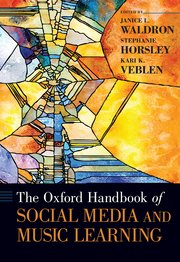
Joseph Abramo published a chapter titled “Social Media, Social Justice, and Music Learning” for The Oxford Handbook of Social Media and Music Learning (Oxford Handbooks, 2020).
Michele Back was named a 2020 internal funding recipient by the UConn Office of the Vice President for Research for her project “Designing Open Educational Resources for Language Teacher Recruitment.” In addition, Back, with Joseph Dean, a doctoral student in curriculum and instruction, published “¡Profesores Adelante! Recruiting Teachers in the Target Language” in the September issue of Foreign Language Annals.
Cara Bernard has been named the 2020 Choral Director of the Year by American Choral Directors Association of Connecticut (CT-ACDA). She will be formally recognized at a virtual celebration in December.
Melissa Bray contributed to the Cambridge Handbook of Applied School Psychology (Cambridge UP, 2020).
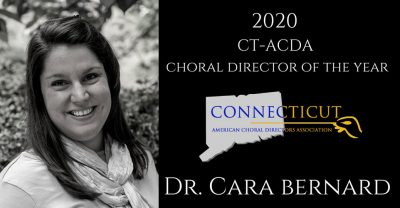
Jacqueline Caemmerer was awarded a $15,000 research grant from the Woodcock Institute for a project titled “Cross-Battery Cognitive-Achievement Relations,” which seeks to address questions about the broader influences of children’s cognitive abilities on their academic achievement. She also was recently invited to join the editorial board of the Journal of School Psychology.
Todd Campbell co-published “What Science and STEM Teachers Can Learn from COVID-19: Harnessing Data Science and Computer Science Through the Convergence of Multiple STEM Subjects” for the September issue of the Journal of Science Teacher Education. He also co-wrote a book chapter “Mentoring Core Practices” for Preparing Science Teachers Through Practice-Based Teacher Education (Harvard Education Press, 2020).
Tutita Casa, E. Jean Gubbins, and doctoral student Stacy M. Hayden published “Support Your Child’s Mathematical Thinking at Home” for the September issue of the National Association for Gifted Children. In addition, Casa co-authored an article titled “Improving Writing Mathematical Arguments” in the November issue of Mathematics Teacher, the National Council of Teachers of Mathematics’ practitioner journal; her co-authors include alumni Jennifer (Artruc) Pallanck ’14 (ED), ’15 MA, Gabriel Castro ’14 (ED), ’15 MA, and Madelyn Williams Colonnese ’07 (ED), ’09 MA ’17 Ph.D.
Milagros Castillo-Montoya has been appointed associate editor of The Review of Higher Education. She has also been selected as the UConn Office of Diversity and Inclusion’s 2020-21 Faculty Fellow.
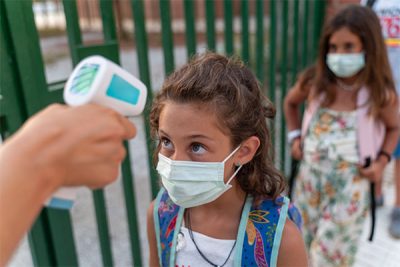
Sandra Chafouleas was featured on UConn Today in “Q&A: Schooling, Caregiving, and Emotional Support During COVID.” In her most recent Psychology Today blog posts, she published a highly trafficked piece on teen suicide, another on talking to kids about the presidential debate, and a third on finding joy through the holiday season. She was also named a co-principal investigator on a $3.9 million Institute for Education Sciences grant with the University of Kansas, along with alumna Amy Briesch ’05 MA, ’09 Ph.D., ’09 MA, ’09 6th Year.
Casey Cobb is principal investigator on two new grants: The first grant, a $20,000 grant through the Connecticut State Board of Education, funds a project centered on examining recruitment and retention of School Choice program applicants per Sheff v. O’Neill, which in 1996 resulted in a landmark decision by the Connecticut Supreme Court that the state was obligated to reduce school segregation in the Hartford region. The second is a $99,982 grant, awarded by the Connecticut Office of Early Childhood, to oversee the evaluation of the federal Preschool Development Grant program in partnership with Yale University’s Partnership for Early Education Research (PEER). Cobb also has been invited to serve on AERA Division L’s Equity and Inclusion Committee.
Ido Davidesco is co-author on “Cross-Disciplinary Research in Biology Education: Challenges and Opportunities” and “Attention Matters: How Orchestrating Attention May Relate to Classroom Learning,” as well as the author of “Brain-to-Brain Synchrony in the STEM Classroom,” all of which appear in the fall issue of CBE – Life Sciences Education.
Hannah Dostal is co-editor of the forthcoming volume The Oxford Handbook of Deaf Studies in Literacy (Oxford UP, 2020), to be released in December. The volume brings together research on literacy learning among deaf and hard of hearing learners, covering such topics as the importance of language and cognition, phonological or orthographic awareness, morphosyntactic and vocabulary understanding, reading comprehension and classroom engagement, written language, and learning among challenged populations. Dostal has also been awarded the Constance McCullough International Research Grant, designated annually to assist a member of the International Literacy Association in international professional development activities outside of the U.S. or Canada. The grant will support Dostal’s project titled “Deaf Students’ Literacy Development in Jamaica: Developing a Knowledge Base and Sustainable Teacher Training Experience,” which seeks to create and test a sustainable and replicable professional development program for supporting educators of the deaf in Jamaica, including designing and coordinating a literacy camp for Deaf and hard of hearing children. Watch a video of Dostal’s thank-you remarks, given in American Sign Language.
Danielle Filipiak this month chairs a panel at the virtual Annual National Council of Teachers of English Convention titled “We Are Our Daughters’ Keepers: Nourishing Powerful Literacies of Black and Brown Girlhood.”
Rachael Gabriel presented a webinar in September titled “Dyslexia Policy Narratives: Public Education, Privatization, and Other Possibilities” for Evidence Based Practice (EBP) Reel Talk (Watch the Zoom recording on Facebook). She also presented at the International Literacy Association virtual conference ILA>Next in October. In addition, Gabriel and Sarah Woulfin were featured in a Read by Example podcast episode in September about their book Making Teacher Evaluation Work: A Guide for Literacy Teachers and Leaders (Heinemann, 2017).
Preston Green contributed to an amicus brief in the NAACP v. DeVos case in September.
Terrell Hill, UCAPP faculty, was a panelist at a roundtable titled “Mind the Gap: Disparities in Education,” hosted in September by Junior Achievement of Southwest New England.
Liz Howard was awarded a three-year $179,000 grant titled “Reimagining Dual Language Education: Promoting Equitable Bilingualism and Biliteracy Outcomes through a Focus on Sociocultural Competence” by the U.S. Department of Education’s Office of Postsecondary Education, International Research and Studies Grants.
James Kaufman co-published “Values Across Creative Domains” for the August issue of The Journal of Creative Behavior. He also co-published “Are Cheaters Common or Creative?: Person-Situation Interactions of Resistance in Learning Context” for the July issue of Journal of Academic Ethics.
Devin Kearns published “Does English Have Useful Division Patterns?” and co-published “Lost in Translation? Challenges in Connecting Reading Science and Educational Practice,” both in the September issue of Reading Research Quarterly. He also co-published “Teaching World and Word Knowledge to Access Content-Area Texts in Co-Taught Classrooms” for the August issue of Intervention in School and Clinic. A mobile device game-like app that helps detect dyslexia earlier with younger kids at risk, developed by a team of educators and scientists led by UConn professors, including Kearns, was featured by UConn Today.
Allison Lombardi virtually presented “Transition: College and Career Ready Assessments” for LEA Academy in September. In addition, she was a featured speaker at the Division on Career Development and Transition’s 2020 virtual conference in October.
Jesse Mala, a CSCH affiliate and visiting assistant professor, was featured on a podcast episode titled “The Potential Impact of Sport and Physical Activity on Youth Living in Poverty.”
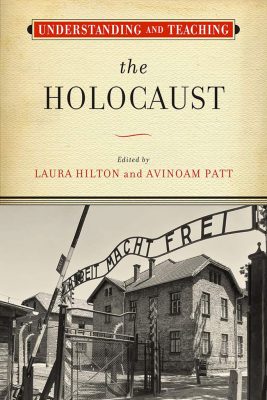
Alan Marcus, who wrote a chapter titled “Teaching the Holocaust With Film” for the book Understanding and Teaching the Holocaust (University of Wisconsin Press 2020), participated in the book’s virtual launch. Held in September, the event was hosted by the UConn Center for Judaic Students and Contemporary Jewish Life.
Adam M. McCready co-published “Measuring Racist Aggressions on Social Media and the Effects on U.S. College Students of Color: An Instrument Validation” for the October issue of Measure and Evaluation in Counseling and Development.
Betsy McCoach, UConn’s Jennifer Dineen, Sandra Chafouleas, along with alumna Amy Briesch ’05 MA, ’09 Ph.D., ’09 MA, ’09 6th Year published a chapter titled “Reproducibility in the Era of Big Data” in Big Data Meets Survey Science: A Collection of Innovative Methods (John Wiley & Sons 2020).
Jennie McGarry was a featured panelist for a virtual panel titled #ThisIsAmerica, hosted by the UConn Alumni Association in September. In October, she was interviewed about gender barriers in sports by the WiSP Tucker Talks podcast. Listen to the full episode.
Jason D. Mizell published “Apprenticeship of Pre-Service Teachers Through Culturally Sustaining Systemic Functional Linguistics” for the August issue of Language and Education and co-published “Toward an Antiracist Genre Pedagogy: Considerations for a North American Context” for the September issue of Tesol Journal.
Glenn Mitoma hosted the “Now What?” series through the Thomas J. Dodd Research Center’s Dodd Human Rights Impact.
H. Kenny Nienhusser was appointed faculty director for La Comunidad Intelectual, a UConn Learning Community with a residential community component focused on supporting students who are a member of, or have a strong appreciation for, the Latinx diaspora. Nienhusser was also named a 2020 internal funding recipient by the UConn Office of the Vice President for Research for his project “Equity-Minded Policy Implementation Imagination to Achieve Greater Higher Education Access for Marginalized Communities” and co-published “Immigration Status and College Students’ Psychosocial Well-Being” for the September issue of Educational Researcher.

James O’Neil wrote an original commentary titled “Why So Many White Men Over 40 Without College Degrees Support Trump” for CT Mirror.
Sally Reis co-published “Research on the Schoolwide Enrichment Model: Four Decades of Insights, Innovation, and Evolution” for the October issue of Gifted Education International.
Del Siegle gave a virtual presentation at Duke University’s Talent Identification Program on the “Report from the NCRGE: Problems and Promising Practices in Gifted Education” in September. In October, he gave multiple presentations, including a live featured keynote and two breakouts, at the 2020 virtual conference for the Alabama Association for Gifted Children, the state’s National Association for Gifted Children (NAGC) affiliate. In addition, Siegle and Sally Reis were featured speakers at the NAGC’s 67th Annual Convention, held virtually in November.
Tracy Sinclair was a participant on a virtual panel titled “DADD Community Chats: Research During COVID.” The event was hosted by the Council for Exceptional Children and the Division on Autism and Developmental Disabilities in September.
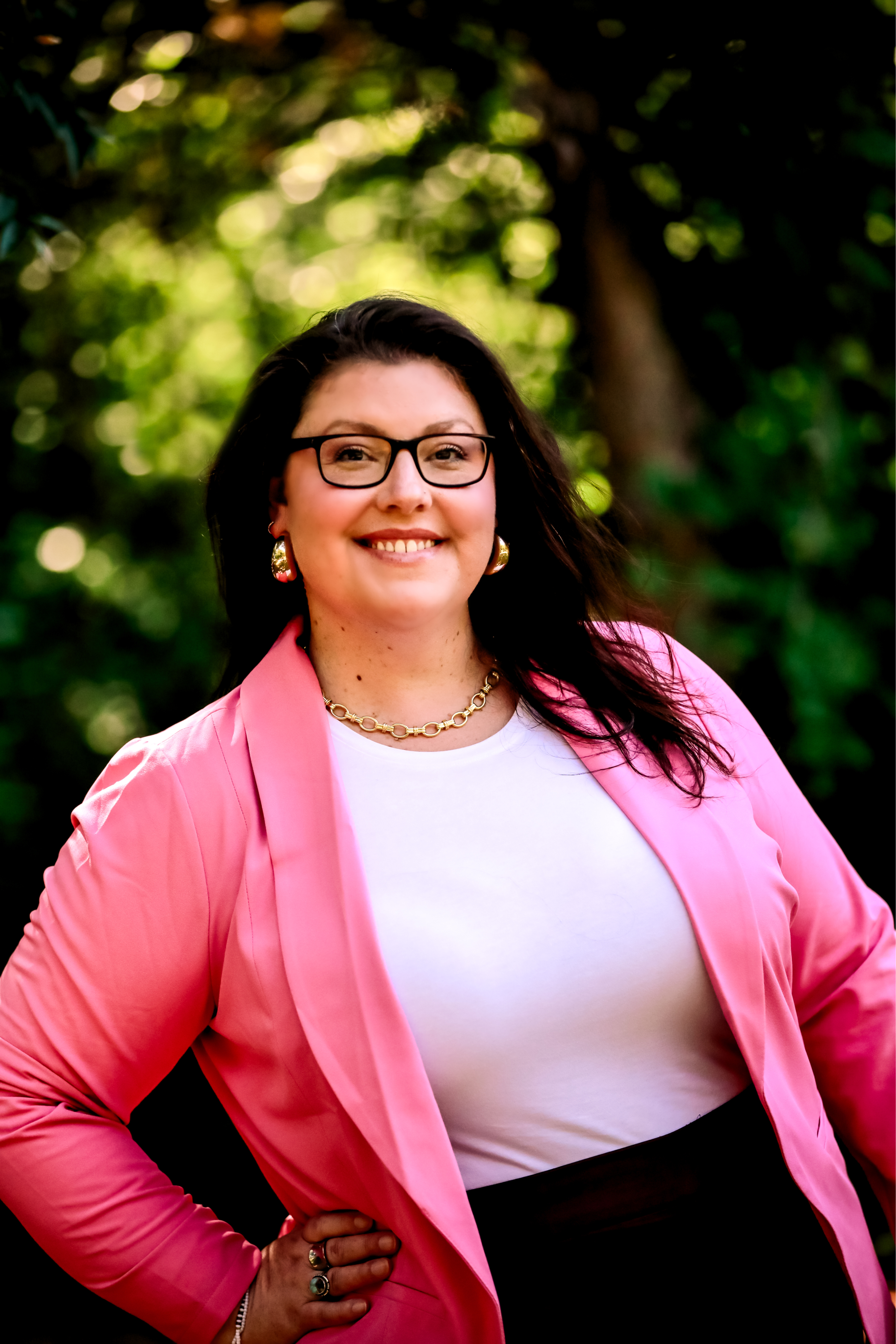
Stephen Slota virtually presented “Star Wars, Super Mario, & Situated Cognition: The Role of Playful Learning in Contemporary Education” in September.
Megan Staples, Mary Truxaw, and Neag School alumna Vanessa Rodriguez Cruz ’05 (ED), ’06 MA, ’16 6th Year published “Developing and Writing Language Objectives” for the October issue of Mathematics Teacher: Learning and Teaching PK-12.
Mary Truxaw published “Dialogic Discourse to Empower Students in Linguistically Diverse Elementary Mathematics Classrooms” for the June issue of Teacher Identity.
Jaci VanHeest and Sandra Chafouleas were presenters in October for UConn’s Research Connections program, developed by the First Year Programs, Learning Communities, and the Office of Undergraduate Research. The interdisciplinary panels were designed to help students understand how UConn’s Research I culture can enrich their undergraduate experience regardless of their major.
Suzanne M. Wilson penned an original article for Chalkbeat about an education colleague and scholar, David J. Cohen, who recently passed away.
Sarah Woulfin, through the Center on Reinventing Public Education, contributed to the Innovation in Learning report shared as part of the research agenda of the Evidence Project, a national collaboration of 170 researchers from more than 100 organizations. The research agenda will help drive new work on COVID-19’s impacts on students, families, educators, and school systems. Woulfin also co-authored “A Letter from the Editors: Reflections on Generative, Cross-Cutting, Transformative, and Timely Education Research” for the September issue of Educational Researcher, the journal of American Educational Research Association.
Students
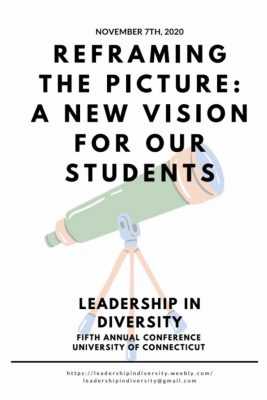 Students from Leadership in Diversity hosted their annual conference with the theme “Reframing the Picture: A New Vision for Our Students.” The virtual conference was held in November.
Students from Leadership in Diversity hosted their annual conference with the theme “Reframing the Picture: A New Vision for Our Students.” The virtual conference was held in November.
Pauline Batista ’16 MA, a current doctoral student in educational leadership, was a co-presenter for a virtual dialogue “Deconstructing Latinidad” in October for UConn’s Democracy and Dialogues Initiative. In September, she also spoke at the “Dialogue About Race in Latin America” event, hosted by Eastern Connecticut State University’s Intercultural Center.

Luz Burgos-López, a doctoral student in educational leadership and UConn’s assistant dean of students, co-presented virtually at “Anti-Blackness in the Latinx Community” for the UConn Foundation in September.
Chelsea Connery, a doctoral student in educational leadership, prepared an issue brief “The Prevalence and the Price of Police in Schools” in affiliation with the Center for Education Policy Analysis (CEPA), examining school and district policies and practices around school resources officers.
Robert Cotto, a doctoral student in education leadership, presented “A Batch Worth Keeping: Frame Analysis of Responses to Latinx School Closure in Hartford, CT” at the NYU Latinx Politics: Resistance, Disruption, and Power virtual conference in September. In addition, he and Preston Green co-published with others “School Funding Disparities and the Plight of Latinx Children” for the September issue of Education Policy Analysis Archives.
Stacy M. Hayden ’17 MA, a doctoral student in educational psychology, gave a presentation at the 67th Annual Convention of the National Association for Gifted Children (NAGC), held virtually in November.

Britney L. Jones, a doctoral student in educational leadership, prepared an issue brief “Reducing Racism in Schools: The Promise of Anti-Racist Policies” in affiliation with the Center for Education Policy Analysis (CEPA), examining school and district policies and practices aimed at eliminating racism.
Kristi Kaeppel, a doctoral student in educational leadership, along with Robin Grenier and UConn Stamford academic advisor Emma Bjorngard-Basayne, published “The F Word: The Role of Women’s Friendships in Navigating the Gendered Workplace of Academia” for the October issue of Human Resource Development Review.
Taylor Koriakin, a doctoral student in educational psychology, along with Sandra Chafouleas and UConn Rudd Center for Obesity and Food Policy researchers, Sarah McKee and Marlene Schwartz, published “Development of a Comprehensive Tool for School Health Policy Evaluation: The WellSAT WSCC” for the December issue of Journal of School Health.
Susan Meabh Kelly, a doctoral student in curriculum and instruction, published “Practical Approached to Advance K-12 Data Literacy” in the September blog of the Community for Advancing Discovery Research in Education. In addition, she was featured in an AERA Division K fireside virtual panel for graduate students in October.
Patricia M. Virella, a doctoral student in educational leadership, published “Leading Through the ‘Influx;’ Leadership Responses and the Influence of a Political Spectacle” for the November issue of Journal of School Leadership.
Alumni

Joshua Abreu ’20 Ph.D. published “Why U.S. Colleges Are Failing at Justice Education” for the August issue of The Crime Report. He is the director of the Center for Teaching and Learning Experience at Albertus Magnus College in New Haven, Connecticut.
Miguel Cardona ’01 MA, ’04 6th Year, ’11 Ed.D., ’12 ELP was featured by CT-N about the Connecticut State Department of Education’s executive committee meeting on the reopening of public schools in Connecticut. The presentation was held virtually in October. Cardona was also featured by News 12 and WNPR about the state of our schools in Connecticut and wrote an original commentary for CT Mirror about continuing schooling in Connecticut.
“Teach By Design,” a blog based at the University of Oregon, recently featured Madison Corlett ’16 (ED), ’17 MA, now a teacher in Mansfield, Connecticut, in a post titled “Suspension Prevention: Classroom Management in Distance Learning.”
Craig A. Cooke ’01 6th Year, ’07 Ph.D. was appointed superintendent of schools for Madison (Conn.) Public Schools. Cooke was named the 2019 Outstanding Superintendent by Neag School of Education’s Alumni Board.
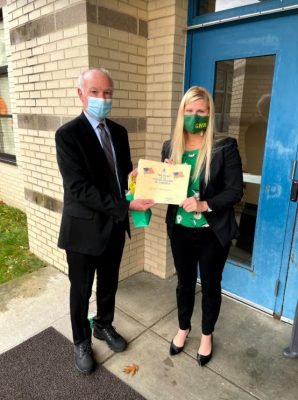
Mark F. Daigneault ’07 (ED) was promoted to head coach of the Oklahoma City Thunder NBA team, after serving as the assistant coach. Prior to joining the Oklahoma City Thunder team, Daigneault was an assistant coach at the University of Florida. During his time at UConn, he was a student manager under Hall of Fame coach Jim Calhoun.
Jennifer DeRagon ’12 6th Year is principal at George Hersey Robinson Intermediate School in Coventry, Connecticut, which has been named a 2020 National Blue Ribbon Award winner for exemplary high performance. The award was given to 367 schools nationwide in recognition of their high academic performance overall or progress in closing achievement gaps among students.
Jamelle Elliott ’96 (BUS), ’97 MA, a former UConn women’s basketball star and current assistant coach of the UConn women’s basketball team, was featured in CT Post.
Elena Forzani ’19 Ph.D. and Eva Yujia Li ’18 MA, ’19 Ph.D., along with Donald Leu, Christopher Rhoads, Betsy McCoach, and others co-published “Characteristics and Validity of an Instrument for Assessing Motivations for Online Reading to Learn” for the October issue of Reading Quarterly Research.
Paul Freeman ’07 ELP, ’09 Ed.D., superintendent of Guilford (Conn.) Public Schools and lead instructor for UCAPP’s New Haven cohort, was named Connecticut’s 2020-21 Superintendent of the Year by the Connecticut Association of Public School Superintendents (CAPSS). Freeman was the Neag School’s 2014 Outstanding Superintendent. Watch his acceptance remarks.
Rashana (Wilson) Graham ’06 (ED), ’07 MA was featured by the New Haven Independent about remote teaching. She is a middle school teacher at Troup Middle School in New Haven, Connecticut.
Isabella “Ivy” Horan ’19 (ED), ’20 MA, a previous Alma Exley Scholarship Program honoree while attending the Neag School as an undergrad, was featured on the program’s blog. Horan is a second-grade teacher at Mayberry Elementary School in East Hartford, Connecticut.
Sushruta Kunnenkeri ’18 MA started a new job as a science teacher at Lexington (Mass.) High School. He is a past Noyce Scholar and graduate of the Teacher Certification Program for College Graduates (TCPCG).
Justis Lopez ’14 (ED), ’15 (MA) and his colleague Ryan Parker have launched Project Happyvism in an effort to drive educators and young people alike to practice self-love and keep joy as the centerpiece of their lives.
Scott F. Nolan ’87 (ED) was recognized by Bristol Community College with the 2020 Dale P. Parnell Distinguished Faculty Award. The event was presented virtually by the American Association of Community Colleges in September.
Jessica Raugitinane ’13 (ED), ’13 (CLAS), ’14 MA, a previous Alma Exley Scholarship Program honoree, was featured on the program’s blog. Raugitinane has been teaching dual-language English and social studies at Mount Vernon Community School in Alexandria, Virginia, for several years.
Graham Rifenbark ’19 Ph.D., Allison Lombardi, and Jennifer Freeman published “A Confirmatory Item Factor Analysis of a School Climate Measure for Adolescents With and Without Disabilities” for the November issue of Educational Assessment.
Orlando Valentin, Jr. ’15 (ED), ’16 MA, a graduate student in educational psychology and fourth-grade teacher at Casimir Pulaski Elementary in Mediden (Conn.), was featured about adapting to educating amid coronavirus in the Hartford Courant.
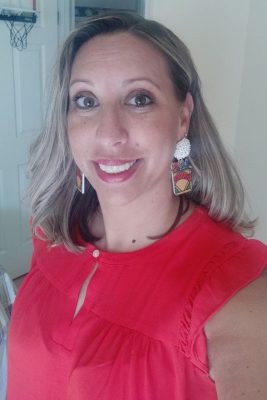
Michelle (Kersten) Wojtyniak ’05 (ED), ’06 MA earned her administration degree from McDaniel College in Maryland and Level 1 Wilson Certification. She is the special education instructional consultant for elementary education for Carroll County Public Schools in Westminster, Maryland. She completed year one of the TIES inclusion grants and hosted numerous webinars this summer for virtual learning.
Joy Wright ’01 6th Year, a principal from King Middle School in West Hartford, Connecticut, presented at Connecticut’s Association of Schools’ (CAS) virtual conference “Closing the Digital Divide: Access, Instruction, Equity” in September. CAS also selected Wright as the 2020 Middle School Principal of the Year.
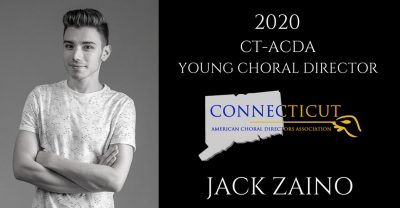
Jack Zaino ’14 (ED), ’15 MA, a teacher at Swift Middle School in Oakville, Connecticut, has been named the 2020 Young Choral Director of the Year by the Connecticut chapter of the American Choral Directors Association.
In Memoriam
Nancy L. Ballard ’72
William B. Berry ’68
Ronald E. Brann ’86
Ethel R. Brown ’42
Thomas Campo ’91
John D. Culbert ’62
Edward A. Deusser ’87
Sonya E. Fein ’80
Brian P. Gardner ’75
Nanette M. Hatzes ’96
Maryann Hayes ’64
Sonya S. Hitt ’64
James Q. Holigan ’56
Bryan A. Knorr ’78
Stephanie M. Kruy ’66
Gary J. Pellegrini ’84
Myrna Rottman ’80
Sally Ann Ryan ’64
Joseph M. Samuels ’72
Charles Senteio ’68
Alice F. Sharkey ’78
Christine H. Southam ’78
Raymond M. Turek ’63
Joanne R. Washburn ’59
Barbara A. Wooten ’59
 Facebook
Facebook
 Twitter
Twitter
 LinkedIn
LinkedIn
